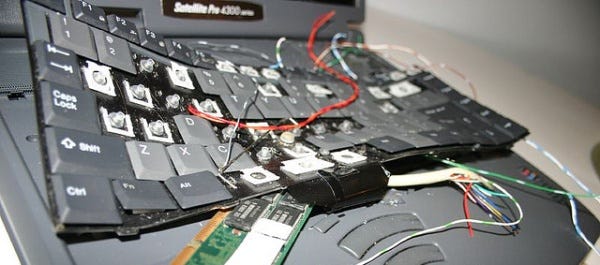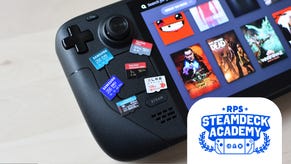As PC Gaming Keeps Climbing, Hardware Sales Down
People, You Need Something To Play Them On
To analyse the state of the PC these days is to spin around until you get dizzy. PC gaming is climbing and climbing, with extraordinary numbers being published for games like Dota 2 and League Of Legends, the massive popularity of the download market, and the phenomenal rise of the indie market. When RPS launched nearly six years ago, there wasn't a single other big-name dedicated PC gaming site online. Now there are many. And indeed multi-format sites have switched from treating the PC as a barely mentioned also-ran, to a significant portion of their coverage. From MMOs to Humble Bundles, eSports to Minecraft, the PC is enormous right now.
So why isn't anyone buying them?
Data recently published by market research firm IDC, and very usefully broken down by Ars Technica, shows that PC shipments dropped more in the last quarter than ever before. Almost every major PC producer, except Lenovo, saw very pointy-down graphs. Even Apple saw their non-iOS units failing to fly out of stores. So what's going on?
Comparing Q1 sales (Jan - March) for 2013 and 2012, HP saw a fall in growth of -23.7%, Dell -10.9%, Acer -31.3%, and ASUS -19.2%. Lenovo, meanwhile, saw their growth sit steady at a flat 0.0%. US-only figures look similar, seeing Apple in the top 5 sellers with a drop of -7.5%, and Toshiba with -5.2%. Again Lenovo bucked the trend here, showing growth of 13.0%.
Clearly this is while the world is still very much in the grip of financial issues - manufacturers across all manner of sectors are showing losses. But it's also impossible not to recognise these drops as indicative of a trend for PC hardware. No, the PC isn't dying (those drops aren't getting close to 0 - the PC still sells well - it just doesn't sell as well as it used to), but it's clearly not too healthy. And the blame seems to be being laid at the feet of Windows 8.
IDC man Bob O'Donnell says,
"At this point, unfortunately, it seems clear that the Windows 8 launch not only failed to provide a positive boost to the PC market, but appears to have slowed the market. While some consumers appreciate the new form factors and touch capabilities of Windows 8, the radical changes to the UI, removal of the familiar Start button, and the costs associated with touch have made PCs a less attractive alternative to dedicated tablets and other competitive devices. Microsoft will have to make some very tough decisions moving forward if it wants to help reinvigorate the PC market."
But clearly the reasons are more widely spread than just Microsoft's ill-advised and distinctly un-PC new operating system. There was a time when if a family wanted to be online, provide their kids with somewhere to do their homework, and have access to email, etc, they had to have a PC. (Heck, I remember when I was 16 (1994), selling entire PCs to parents just so they could run Encarta for their kids' homework.) And that time stuck around for a good long while. But now a tablet can do much the same. With the exception of a useful way of doing word processing, the family PC - that so often morphed itself into a gaming PC - has been much usurped by other smaller, often cheaper devices. If you want to check emails, you'll most likely do it on your phone, rather than boot up the giant wheezing box in another room, or even bother opening up the laptop. And while I think common sense dictates that a full size keyboard, separate mouse, nice big detached monitor (or two), and a device properly designed to cope with multitasking still remains a very preferable solution, there's no point in denying it's not winning that battle.
Then there's also the rapid demise of the netbook. It feels like only yesterday complete strangers would approach me in a coffee shop or on a plane to coo at my miniaturised laptop, and comment on how useful one would be. Then POW, they were everything, everywhere. And then as quickly they were gone. The Ultrabook - a sort of middleground that wasn't so tiny your hands looked like a giant's mad claws, trying to wrestle with the half-gig of RAM that could be tucked into the casing - also doesn't seem to be faring too well in a world where magic Star Trek flat-panel touch-screens let you sweep and swoosh your way through most of the same tasks.
But no, obviously, bloody Windows 8 hasn't helped. Microsoft's death-grip on the PC sales industry, such that it's nigh-impossible to walk into a store and buy a PC device without having it pre-infected, has put many off buying the hardware. It's bemusing blend of a touch-screen interface and over-complication of the most primary PC purposes looks like it will be remembered as one of the most damaging moments in PC history. While Vista was utterly terrible, it at least looked like Windows, and Windows 7 was hurried along to replace it with something far superior. At this point, if Microsoft wants to recover from Vista II: The Even Vistarier, it's going to have to do some very awkward about-facing, back-tracking, and tacit-admitting of its failures. Something at which the company isn't too brilliant.
It also hasn't helped that both HP and Dell have both been through major restructuring in the face of their lack of profits. But the Lenovo story is one worth paying proper attention to. In the last year the company has been making statements about its desire to push itself from a relative unknown to the average household, to a big player (although in fairness, they were saying the same, less successfully, in 2006). They've focused hard on PC in the last 12 months, and as a result - and indeed while not endlessly restructuring themselves - they've proved steady. It's evidence that there's still gold in these here hills.
But what next? It's interesting that IDC's analysis is not, "And thus this is a sign that the PC will soon disappear...", but rather focused on how the industry can turn itself around. The reality is, as great as tablets and phones really are, they just don't have an adequate replacement for a mouse and keyboard when it comes to practical computing. And none is yet a serious player when it comes to top-end gaming. For business, the PC still remains the most practical solution, and as has been the case since the early 90s, it's the success of the PC as a practical instrument that seems to be behind its success as a gaming platform. PC gaming has always been about the subversion of the tool.
What stands out as especially interesting to us, however, is what exactly a PC really is. When it comes to RPS, where does the line between personal computer, and tablet running a PC-like operating system, with options for mouse/keyboard attachments? Is the Microsoft Surface Pro a PC or not? Will we, eventually, see our remit covering something a lot broader than the big grey box and its folding portable pal? Or will everyone at a certain point realise that typing on a touch screen is BLOODY HORRIBLE, and just remember proper PCs again? However things work out, it's important that people don't resort to shouting, "THE PC IS DYING!" (because it's REALLY annoying). Gaming - the good bit - is madly healthy right now.











